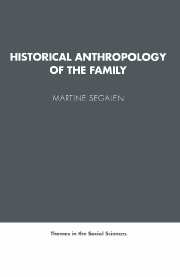INTRODUCTION
Published online by Cambridge University Press: 14 January 2010
Summary
Can there be such a thing as a sociology of the family? Unlike other areas in which we may admit that we have no special competence, this particular field is, naturally enough, one we all feel we know well-we were all born into a family and, perhaps, have started one. This empirical, felt knowledge of the family makes it one of the most ideologically loaded of topics.
The family also holds some of the keys to our future as a nation. Should families cease to produce enough children as some demographers, historians and politicians have already claimed with alarm, should couples break up and teenagers harass people in the streets, then the state will look for ways and means of setting the family on a path with a less disastrous significance for the future, and at a lower social cost.
TALKING ABOUT THE FAMILY: PARADOXES AND CONTRADICTIONS
The assumptions on which we base our judgements concern the contemporary family, as compared to some mythical one that is ‘felt’ rather than analysed or known. The press and television echo the same clichés and talk of the ‘disintegrating family’, ‘the weakening of the family’, ‘state aid for the family’, ‘the family at risk’ and so on, stressing the link between the idea of family and the notion of crisis.
It would be useful at this point to suggest briefly the major ways in which this theme is formulated before going on to analyse them in the subsequent chapters. In our time, the family has contracted. It consists now of the couple. It is a unit of consumption rather than of production.
- Type
- Chapter
- Information
- Historical Anthropology of the Family , pp. 1 - 10Publisher: Cambridge University PressPrint publication year: 1986



